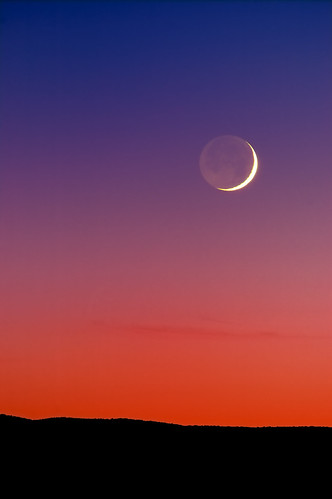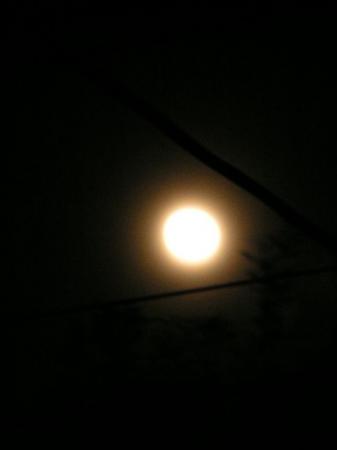
(Today's post is continued from the one on the 11th Nov.)
For ancient people, who lived so closely to the nature, it could be easier to observe the moon waxing and waning rather than the orbit of the sun in different seasons, to feel the passing time, and therefore, the lunar calendar was commonly used in various countries, like in China (Chinese still use it as often as the solar calendar.)
Are you familiar with a wide range of vocabulary in Japanese language referring to the moon?
'Mochi-zuki', 'amamitsu-tsuki', 'monaka-no-tsuki', 'tsuki-no-kagami' are different names calling a full moon.
A half moon is expressed as 'gen-getsu' (literally meaning 'bowstring moon'), 'kataware-zuki' ('cracked-into-half moon'), a crescent moon as 'mayu-zuki' ('eyebrow moon'), 'tsuki no tsurugi' ('the sword of the moon'), 'hatsu-zuki' ('the first moon'), 'tasogare-zuki' ('dusk moon'), and a new moon as 'saku' ('the first').
Izayoi (a moon sixteen days old) was named after a verb, 'izayou' (meaning 'hesitate'), and a seventeen-days-old moon is 'tachimachi-zuki' (stand up and wait for the moon), a eighteen-days-old moon is 'imachi no tsuki' (sit down and wait for the moon), a nineteen-days-old moon is 'nemachi no tsuki' (lie down and wait for the moon).

There is a great influence of the moon in Japanese literature for many centuries including poems (Haiku, Tanka) and novels.
Yosano, Akiko (1878-1942), who is one of the famous poets in Taisho, Showa Era, created a word, 'sakura zuki-yo' (literally meaning, 'moonlit night with cherry blossoms') expressing a dimly misty moonlit night in spring. It reflects Japanese aesthetic.
Hagiwara, Sakutaro (1886-1942) is also one of the famous poets at the same period as Yosano, Akiko, and his name, Saku, means a new moon (means north, too). The title of his most known work is "Howling at the moon".
Japan is a country blessed by great natural beauty - in spring, the warmth of soil, in summer, blessed green and water, in autumn, crop and harvest, in winter, stay calm in the snow waiting for spring to come...
The moon was admired as a symbol of rebirth, unlike the other natural objects symbolizing the transience of life, for centuries through the changing of seasons.
The Japanese cultural background has been explained from various points of view to clarify why there are many different kinds of the moon in the lyrics of Fujifabric's.
The main songwriter of the band, Mr. Shimura, read all sorts of novels and poems, so the lyrics could have been inspired by some of those works.
For example, 'a misty moonlit night' in "Kanjo Nanagosen" (The Number 7 Ring Road in Tokyo).
It is so obvious that "driving so fast at night on the number 7 Ring Road for no reason" is one of spring nights.
Surely, Mr. Shimura used the word, "oboro zukiyo" ('a misty moonlit night') as a word which signals the spring season or not, but it is for sure that a misty moon is often seen in spring as a natural phenomenon.

'A waxing and waning moon' in "Ukigumo" (Floating cloud).
The moon, that 'I' am gazing on the top of the hill as usual, waxes and wanes. The lyrics implies that time passes as the moon waxes and wanes, and 'I' often climb up that hill to gaze the moon.
The part, "I am like a floating cloud" can be understood in two ways.
At first, "When watching the moon on the hill, I feel like I have become a cloud floating in the night sky.".
Another meaning is that "I have already chosen a path of a musician and have made up my mind to go alone, but I have no idea what will happen in the future... " because 'a floating cloud also means an itinerant life-style.
'Calm quiet moon-viewing night' in 'Maria and Amazoness'.
In this song, the phrase, 'calm quiet moon-viewing night' , is used to express a night with a good sleep, and it leads us to imagine a quiet autumn night with a beautiful moon in the sky in the cool wind hearing the sound of crickets.
Mr. Shimura's image of 'calm quiet moon-viewing night' might be one of those autumn nights.
In Fujiyoshida City in Yamanashi Prefecture, a wonderful moon must be viewed in the fresh air on the foot of Mt. Fuji. In the night of Fuji Fuji Fuji Q (Fujifabric's concert) last July, the beautiful crescent was seen in the sky.
Even on summer night, the moon is so beautiful in the town, so in autumn and winter, it must be even more beautiful.
Enjoy listening to Maria And Amazoness.

No comments:
Post a Comment